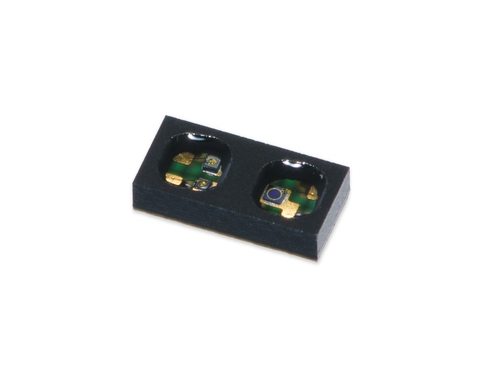1300-1650nm light source and photodetector integrated into one package
SWIR type reflective sensor "KPR series"

SWIR type reflective sensor KPR series (Photo: Business Wire)
SHIMOTSUKE-SHI, Japan--(BUSINESS WIRE)--Kyoto Semiconductor Co., Ltd. (President and CEO: Yoshihisa Shinya, Headquarters: Shimotsuke-shi, Tochigi, Japan), a leader in optical device solutions with Japanese quality manufacturing based on world-class technology, has announced 14 products of SWIR*1 type reflective sensor “KPR series”.
Development Background
The SWIR type reflective sensor "KPR series" was developed expecting to be used in a wide range of applications such as the medical and healthcare fields, analysis and measurement fields, office electronic equipment fields, and sensing of various materials. Kyoto Semiconductor handles an extensive variety of SWIR type LEDs (light emitting elements) using InGaAsP*2 and SWIR type photodiodes (light receiving elements) using InGaAs*3. In the past, the light-emitting element and light-receiving element were handled individually, but today we have newly developed a product that incorporates the light-receiving and light-receiving elements into a single small package to meet the increasing market needs.
Product Features
The "KPR series" consists of a LED chip and a photodiode chip manufactured in Kyoto Semiconductor's domestic factory, mounted next to each other in a small package. It is a reflective sensor that performs sensing using the reflection of light when the product is pointed at an object to be sensed. The KPR series has two types of reflective sensor, the KPR-DS6 and the KPR-S6. The KPR-DS6 type is a 3-chip mounted dual-wavelength reflective sensor equipped with two wavelength LEDs and one photodiode. The KPR-S6 type is a 2-chip mounted single-wavelength reflective sensor equipped with one LED and one photodiode. We developed 14 types of reflective sensors in total, including 10 types of dual-wavelength reflective sensors and 4 types of single-wavelength reflective sensors, they are available for various wavelengths and combinations.
Package size reduced by 30%
The small and thin package of length 4.2 mm x width 2.0 mm x height 0.9 mm is a surface mount type package (patent pending) that senses near-infrared reflected light with high efficiency, originally developed by Kyoto Semiconductor, and is compatible with lead-free reflow solder mounting. The package size is 30% smaller than the company’s existing model. By adopting a small and thin package, it can be installed in handheld measurement equipment and wearable equipment.
Various wavelengths and combinations
The sensing of the KPR series uses near-infrared lights with a wavelength of 1300 to 1650 nm. Since these lights are in a wavelength range that is absorbed by moisture, various gases, organic substances, etc., it is possible to detect the content of the substances by using the reflection and absorption of light. By selecting the wavelength, it is expected to be used for sensing component such as glucose, moisture content detection, and sensing of various resins and gases. It can also be used as a general-purpose photoelectric sensor or proximity sensor.
Mass production of the SWIR type reflective sensor “KPR series” is scheduled to start on August 31, 2023.
|
Line-up
|
|
KPR-S6 type single-wavelength reflective sensor
|
|
Model
|
LED (Emission Wavelength)
|
PD (Sensitivity Wavelength)
|
|
810nm
|
1300nm
|
1450nm
|
1550nm
|
1650nm
|
800~1700nm
|
1000~1700nm
|
|
KPR813DS6
|
〇
|
〇
|
|
|
|
〇
|
|
|
KPR814DS6
|
〇
|
|
〇
|
|
|
〇
|
|
|
KPR815DS6
|
〇
|
|
|
〇
|
|
〇
|
|
|
KPR816DS6
|
〇
|
|
|
|
〇
|
〇
|
|
|
KPR1314DS6
|
|
〇
|
〇
|
|
|
|
〇
|
|
KPR1315DS6
|
|
〇
|
|
〇
|
|
|
〇
|
|
KPR1316DS6
|
|
〇
|
|
|
〇
|
|
〇
|
|
KPR1415DS6
|
|
|
〇
|
〇
|
|
|
〇
|
|
KPR1416DS6
|
|
|
〇
|
|
〇
|
|
〇
|
|
KPR-S6 type single-wavelength reflective sensor
|
|
Model
|
LED (Emission Wavelength)
|
PD (Sensitivity Wavelength)
|
|
1300nm
|
1450nm
|
1550nm
|
1650nm
|
1000~1700nm
|
|
KPR13S6
|
〇
|
|
|
|
〇
|
|
KPR14S6
|
|
〇
|
|
|
〇
|
|
KPR15S6
|
|
|
〇
|
|
〇
|
|
KPR16S6
|
|
|
|
〇
|
〇
|
*1 SWIR: Short-Wavelength InfraRed defined as infrared light in the wavelength range of 900~1700nm
*2 InGaAsP: Indium gallium arsenide phosphorus A type of semiconductor
*3 InGaAs: Indium gallium arsenide A type of semiconductor
About Kyoto Semiconductor
Kyoto Semiconductor was founded in Kyoto in 1980 as a specialized manufacturer of optical semiconductors. We manufacture high-performance, high-precision semiconductors for optical communications and sensors at its own facilities in Japan using an integrated front-end to back-end manufacturing system based on unique packaging technology and supplies these products to customers around the world. Kyoto Semiconductor leads optical device solutions with Japan quality manufacturing with world-class technology.
*Product names, company names, and organization names mentioned in this press release are trademarks or registered trademarks of their respective companies.
*All contents of this press release are current as of the date of publication. Please note that this is subject to change without notice.
TrendForce 2023 Infrared Sensing Application Market and Branding Strategies
Release: 01 January 2023
Format: PDF
Language: Traditional Chinese / English
Page: 164
|
If you would like to know more details , please contact:
|





 CN
TW
EN
CN
TW
EN






